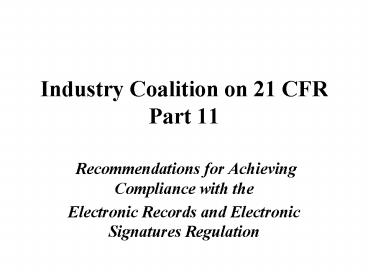Industry Coalition on 21 CFR Part 11 - PowerPoint PPT Presentation
1 / 20
Title:
Industry Coalition on 21 CFR Part 11
Description:
Major cost ultimately for the consumers who purchase the products of the affected industries. ... driven approach acceptable to FDA and regulated industries. ... – PowerPoint PPT presentation
Number of Views:33
Avg rating:3.0/5.0
Title: Industry Coalition on 21 CFR Part 11
1
Industry Coalition on 21 CFR Part 11
- Recommendations for Achieving Compliance with
the - Electronic Records and Electronic Signatures
Regulation
2
Who are we?
- Advanced Medical Technology Association (AdvaMed)
- Consumer Healthcare Products Association (CHPA)
- Cosmetic, Toiletry and Fragrance Association,
(CTFA) - Council for Responsible Nutrition (CRN)
- Generic Pharmaceutical Association (GPhA)
- National Food Processors Association (NFPA)
- Pharmaceutical Research and Manufactures of
America (PhRMA)
3
Value of the Regulation
- FDA has recognized and facilitated a paradigm
shift
4
Value of the Regulation
- Enables electronic submission without paper
copies, and review of components of marketing
applications,and related documents - Facilitates industry and FDA use of more
efficient and effective business processes
e-Records and e-Signatures replace many
paper-based processes. - Aids in avoiding mistakes and fraud, preserving
and protecting electronic GxP records, and
maintaining product quality and data integrity.
5
Value of the Regulation
- Leads to harmonization of e-Records and
e-Signatures within and across agencies and the
regulated industries - Helps provide clear requirements specifications
to key commercial software suppliers.
6
Coalition Position
- Support general principles of Regulation
- Implementation highlights unexpected problems
- Scope broader than initial intent
- Diversity of interpretation leads to
- compliance uncertainty
- deferral of IT investment
- Dialogue with FDA best way to workable compliance
7
Recommendations
- We have six.
8
Electronic Records and Signatures
- Same requirements for electronically signed
e-records and paper records. - E-signature defines creation of e-record subject
to audit trail. - Continue to accept hand signed and dated computer
printouts. - PDF image acceptable as electronic form of raw
data.
9
Implementation Timing
- Current validated systems adequate to produce
safe, high quality products. - Require compliance as systems replaced or
upgraded as part of their normal life cycle. - To replace or upgrade outside normal life cycles
projects multi-billion-dollar cost. - Major cost ultimately for the consumers who
purchase the products of the affected industries.
10
Implementation Timing
- We propose
- existing applications, often a mix of electronic
and paper-based records/signatures, and are
compliant with GxPs, incorporate aspects
necessary to comply as part of normal
replacement/upgrade cycle - each company develops a replacement/upgrade plan
in line with normal system life cycles - update plan periodically to reflect progress
- make progress reports available for FDA
inspections.
11
Risk/Benefit Driven Approach
- Apply control mechanisms for e-Records
proportional to potential impact on public
health. - Use hierarchical approach to implementation for
applications, data and reports, similar to SUPAC.
- Develop benefit-driven approach acceptable to
FDA and regulated industries.
12
Risk/Benefits Driven Approach
- We propose
- rank affected applications according to benefits
expected from application of Regulation. Similar
ranking for data (by type) and documents (by
type, e.g., SOPs, reports, etc)..
13
Commercially Available Software
- Regulated industries rely on mature commercial
products from market leaders. - Industry conservative regarding adoption of new
technologies. - Companies depend on vendor software and its
ability to facilitate compliance. - Few companies prepared to revert to custom
in-house software development.
14
Commercially Available Software
- Vendors need 18-36 months for major new software
releases this limits industrys ability to
respond rapidly. - In the early stages there may be problems with
the reliability and scalability of these products.
15
Commercially Available Software
- We propose
- companies list systems with realistic times for
adopting new off-the-shelf systems that require
minimum customizing. The Coalition will
cooperate with vendors to facilitate rapid
development of the required products
16
Long-term Archiving
- Continuous advances in electronic storage media
and IT standards render current technology
obsolete and eventually not maintainable. - New generations of database technology generally
appear in 10-year cycles. - A complex task requiring the agency and the
regulated industries working together to develop
a viable approach.
17
Economic Impact Analysis
- Although some elements of the Regulation are
described as being voluntary, in practical terms
they are required. - FDA should conduct an Economic Impact Analysis
(EIA) to assess the additional regulatory burden
and to guide appropriate implementation.
18
Economic Impact Analysis
- EIA should include economic and public health
benefits gained by implementing the Regulation. - Regulatory requirements must be consistent with
other government initiatives, such as the
Paperless Environment 2002, Paperwork Reduction
Act, the Mutual Recognition Agreement (MRA), and
new or pending legislation.
19
Guidance
- Effective compliance requires clear FDA guidance
to the regulated industries and in compliance
policy guides. - Guidance should consider the six Coalition
recommendations. - Guidance should describe good faith compliance
expectations. - Regulated industries need opportunity to provide
input early in development of guidance.
20
Summary
- The Coalition will,
- Lead regulated industry, cooperate with FDA in
realizing the benefits of the Regulation through
a common interpretation. - Provide qualitative and quantitative data for
constructive use to work with the FDA and other
regulatory agencies here and abroad. - Provide a means for coalition members and others
to benchmark current best practices, both
procedural and technical.

